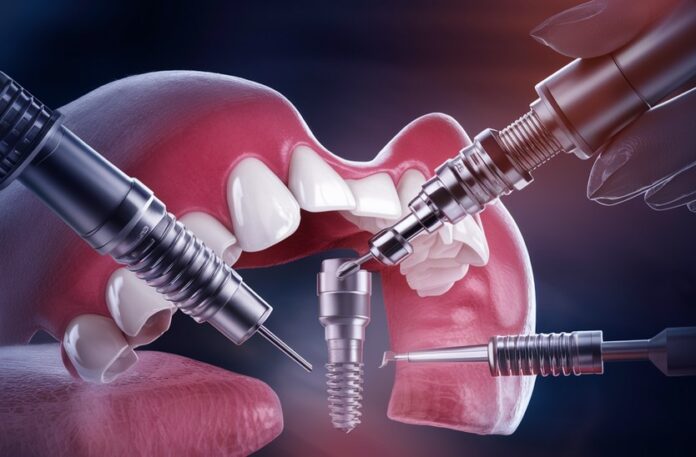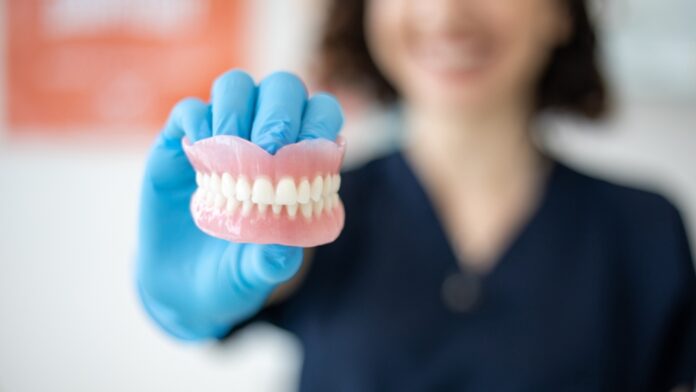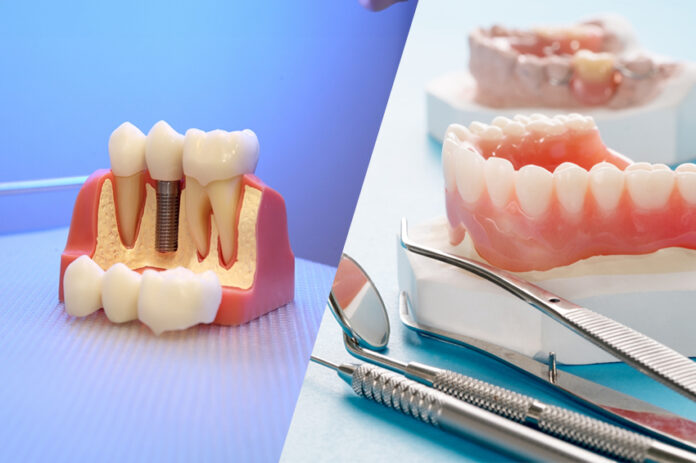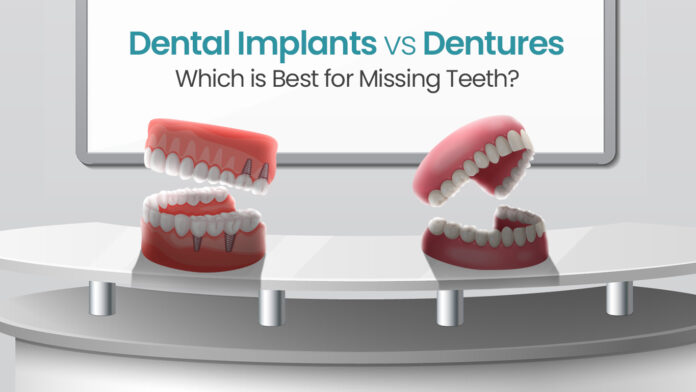Hey there! If you’re considering options for replacing missing teeth, you’ve probably come across two main choices: dental implants and dentures.
Both have their pros and cons, and the right choice really depends on your specific needs, lifestyle, and preferences. Let’s chat about both options to help you figure out which might be the best fit for you.
What are Dental Implants?

Dental implants are like the superheroes of tooth replacement. They’re small, titanium posts that are surgically placed into your jawbone where teeth are missing.
Once they’re in place, they fuse with your bone over a few months in a process called osseointegration. After that, they serve as sturdy anchors for artificial teeth, like crowns or bridges.
Advantages
- Longevity: With proper care, dental implants can last a lifetime.
- Natural Look and Feel: They look and feel just like your natural teeth.
- Bone Health: They help prevent bone loss by stimulating the jawbone.
- Stability: No slipping or clicking, which is often a concern with dentures.
Disadvantages
- Cost: They can be pricey upfront.
- Surgery: The procedure involves surgery, which can be intimidating for some.
- Time: The process can take several months from start to finish.
What are Dentures?


Dentures are removable appliances that replace missing teeth. They come in two main types: full dentures, which replace all the teeth in the upper or lower jaw, and partial dentures, which fill in the gaps when some natural teeth remain.
Advantages
- Cost-Effective: Generally less expensive than implants.
- Non-Surgical: No surgery required, which is a big plus for many.
- Quicker Solution: The process of getting dentures is usually faster than implants.
Disadvantages
- Comfort: They can sometimes feel bulky or uncomfortable.
- Maintenance: Requires daily cleaning and can be prone to slipping.
- Bone Loss: They don’t prevent bone loss, which can change the shape of your face over time.
Comparing Comfort and Convenience
Comfort and convenience are big factors when choosing between dental implants and dentures. Dental implants, once healed, act just like your natural teeth.
You can eat, speak, and smile without worrying about them shifting. Dentures, on the other hand, may require some adjustment time. They can also slip when eating or speaking, which might be a bit embarrassing.
Eating and Speaking
Implants allow you to eat all your favorite foods without restrictions. Corn on the cob, apples, steak – you name it. With dentures, you might need to be a bit more cautious.
Hard or sticky foods can be tricky, and there’s always that fear of them slipping mid-bite. Speaking with dentures can also take some getting used to, especially for sounds that require the tongue to touch the teeth, like “s” and “th”.
Maintenance and Care
Daily care routines differ quite a bit between implants and dentures. Dental implants are pretty low-maintenance. You brush and floss them just like your natural teeth. Regular dental check-ups are still important to ensure everything stays in top shape.
Dentures require a bit more attention. They need to be removed and cleaned daily. It’s also recommended to soak them overnight in a denture-cleaning solution. Partial dentures come with the additional task of cleaning around your remaining natural teeth to prevent decay and gum disease.
Cost Considerations
Cost is often a significant factor in the decision-making process. Dental implants can be more expensive initially, but they’re a long-term investment. Once placed, they don’t need to be replaced unless something goes wrong, which is quite rare.
Dentures are generally less expensive up front, but they might need to be replaced every 5-8 years due to wear and changes in the shape of your mouth. There are also ongoing costs for cleaning solutions and potential adjustments.
Insurance and Financing
It’s worth noting that dental insurance might cover part of the cost for both options, but coverage varies. Some plans cover dentures but not implants, or only a portion of the implant procedure. Financing options are available at many dental offices to help spread out the cost over time.
Aesthetics and Self-Esteem
How your teeth look can have a big impact on your self-esteem. Dental implants look and feel like your own teeth, which can boost confidence significantly. They’re designed to blend seamlessly with your natural teeth, so no one will know you have them unless you tell them.
Dentures have come a long way in terms of aesthetics. Modern dentures look much more natural than they used to, but some people still feel self-conscious about them, especially if they click or slip while speaking or eating.
Health Considerations
Your overall health can also influence your choice. Dental implants require healthy gums and sufficient bone structure to support the posts. If you have conditions like diabetes or osteoporosis, your dentist might need to take special precautions or recommend dentures instead.
Dentures are often recommended for patients who might not be good candidates for surgery. However, it’s important to maintain good oral hygiene and regular dental visits to ensure your gums stay healthy.
Which is Right for You?


Choosing between dental implants and dentures is a personal decision that should be made with the guidance of your dentist. Dentists can see a broader picture, as they have deeper insights into your health condition, and help you make an informed decision. Here are a few questions to consider:
- How many teeth need replacing?
- Are you comfortable with undergoing surgery?
- What’s your budget for tooth replacement?
- Do you have any health conditions that might affect your choice?
- What’s more important to you: initial cost or long-term benefits?
Final Thoughts
Both dental implants and dentures have their place in tooth replacement, and each has its own set of benefits and drawbacks. Dental implants offer a permanent, natural-looking solution that can enhance quality of life, while dentures provide a cost-effective, non-surgical alternative.
I hope this comparison has helped clarify some of the differences between the two options. If you’re still unsure, have a chat with your dentist. They can provide personalized advice based on your individual needs and help you make the best decision for your smile.







